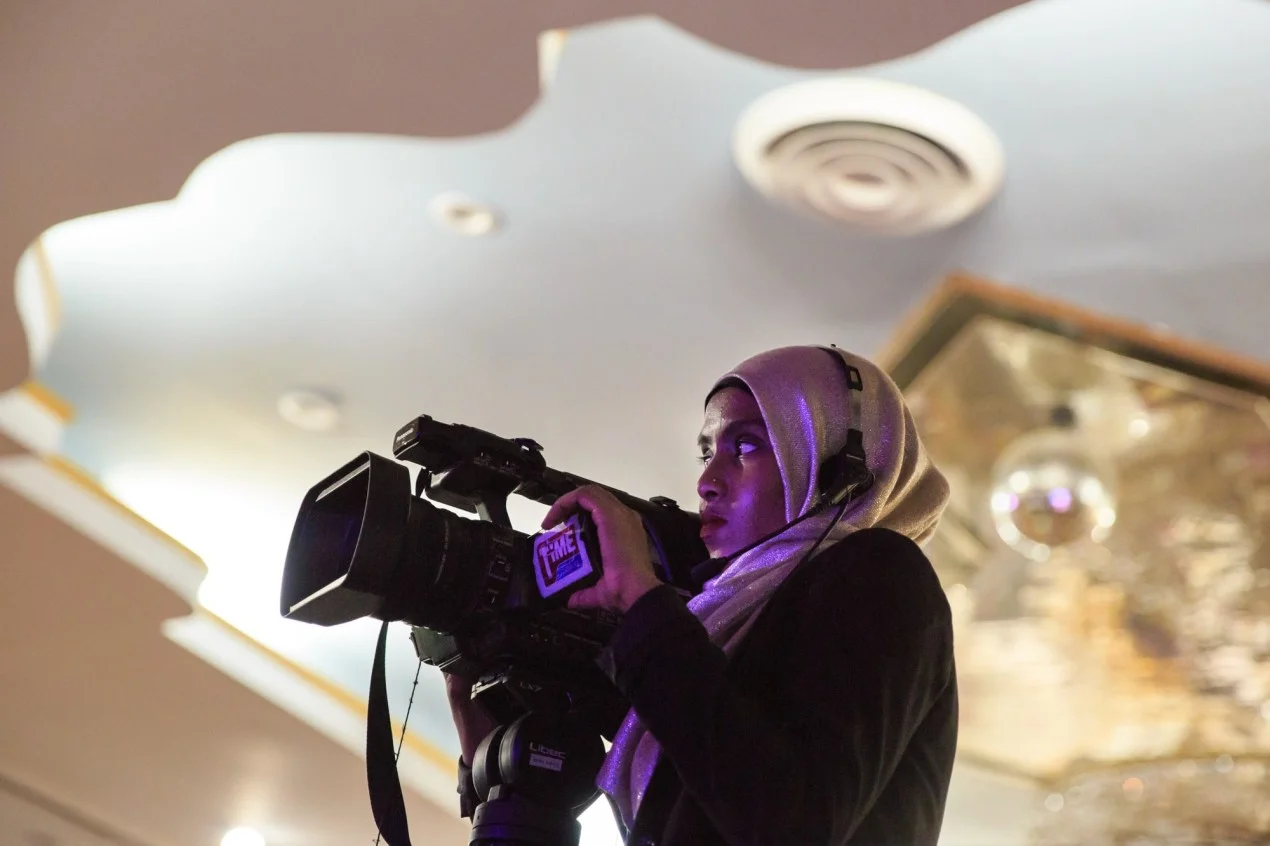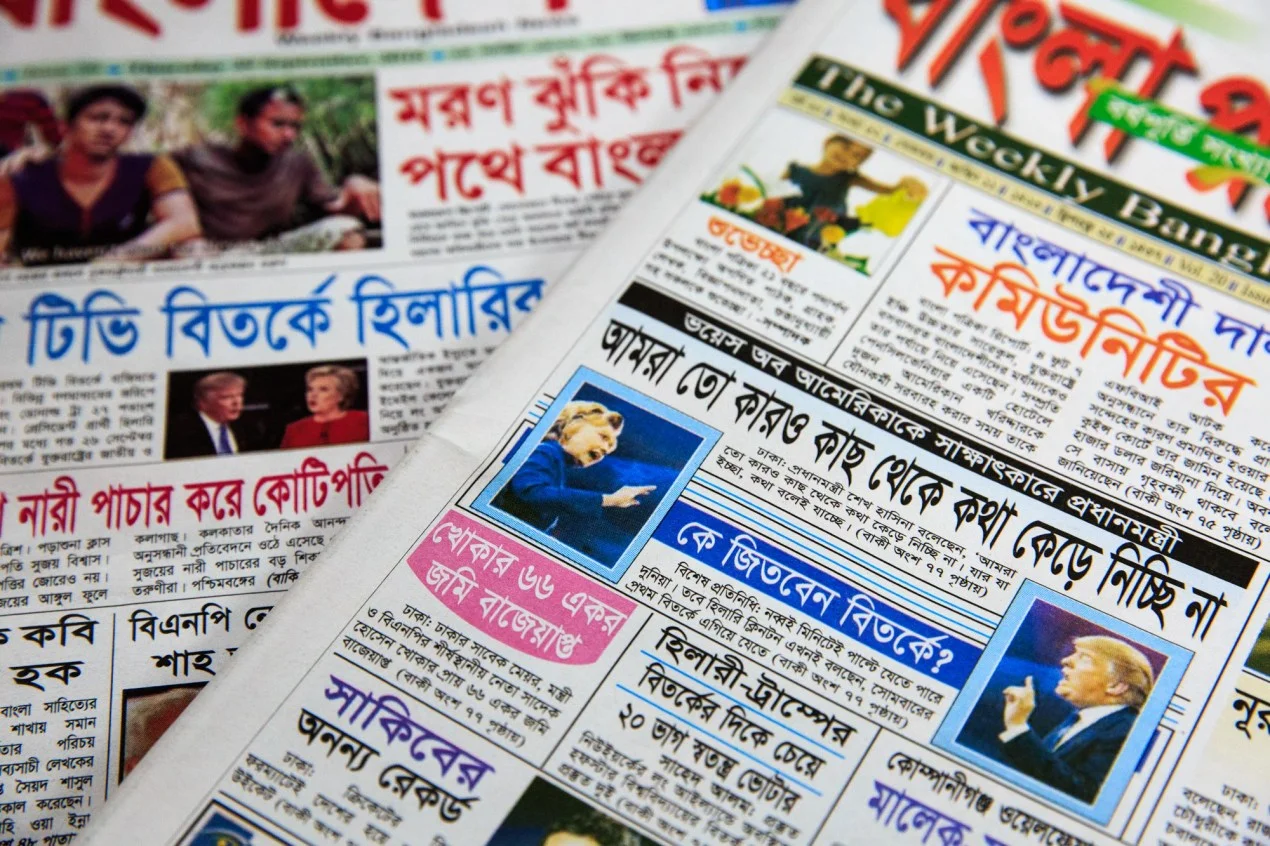Watching America's Soap Opera Election
By Mansi Choksi
Shahed Alam, dressed in a trim black suit, is pacing outside a marriage hall in Queens, talking to himself about Hillary Clinton and Donald Trump. Inside, past an ivory-keyed grand piano, raindrop chandeliers, and an elegant staircase, a middle-aged Bangladeshi-American couple slow-dances on a hulking stage, attendees of a party celebrating the second anniversary of the New York-based, English- and Bengali-language TV station Time Television U.S.A.
It’s September 26, and by 10 p.m., as guests dart for the dinner buffet following appearances by a Hindustani classical singer, a children’s folk dance troupe, a teen pop star, and an official from the mayor’s office, the first U.S. presidential debate, taking place 18 miles east at Hofstra University, is heating up. A bespectacled senior watching the debate on his iPad begins walking around the room, tsk-tsking.
Alam, the TV station’s political correspondent, takes the stage to film a live segment summarizing the debate’s highlights for the channel’s evening bulletin. Clinton and Trump have entered one of the final battlegrounds of the presidential election, Alam explains in Bengali, taking a seat on the stairs as little girls dressed as sunflowers flit around behind him, shrieking. Trump promised to release his taxes if Clinton, who many believe to be a friend of Bangladesh, releases her controversial emails, he continues. It has yet to be seen how their performance at the debate will affect the polls, he says, signing off. The studio then cuts back to Time TV’s lead story: coverage of its own anniversary party. The bulletin will be broadcast to roughly two million viewers, Alam says, a majority of them in the United States.
More than 250,000 people of Bangladeshi origin live in the United States, according to U.S. census data. A majority of them are foreign-born and do not speak English as their first language. Almost half the Bangladeshi-American voters surveyed by the Asian American Legal Defense and Education Fund, an advocacy group, reported limited English proficiency.
In 2012, Bangladeshi-Americans were the largest group of first-time voters among Asian Americans, the report said. In Queens, 28 percent of Bengali-speaking voters said they preferred to cast their ballot with the assistance of an interpreter or translated materials.
Up to 37 percent of Bangladeshi-Americans rely on ethnic media as their primary source of news, and the competition is fierce. In New York, Time TV competes with two other television networks. Its affiliated Bengali-language newspaper, The Weekly Bangla Patrika, competes with sixteen similar papers.
According to Alam, his competitors on the other networks are preoccupied with news from Bangladesh, while he immerses himself in U.S. politics. He consumes countless hours of American news, tracking each twist and turn in the election cycle and its implications for the Bangladeshi diaspora.
“I’ve met hundreds of Bangladeshis who can vote in the U.S. but don’t know what is going on,” he says. “The political system here is very tough, so I try to explain.” In one segment, he explains blue and red states by drawing parallels to strongholds of rival Bangladeshi political parties, the Awami League and Bangladesh Nationalist Party. In another segment, he explains how electronic voting machines work.
Most Bangladeshi-Americans identify as Democrats, Alam says. Hillary Clinton has visited the country twice and is friends with Muhammed Yunus, the Bangladeshi Nobel Peace Prize-winner who pioneered microfinance and microcredit. “A very small percentage are Trump supporters,” he says, “despite his bigotry and Islamophobia.”
Alam radiates earnestness, thinking of himself as a guide for the trembling elders, small business owners, and the housewives encountering the intimidating American political system for the first time. Until a year ago, he worked as on-air journalist for Channel 24 in his hometown of Dhaka, Bangladesh’s capital city, reporting on politics, crime, and the environment. During the country’s national election in 2014, he was a familiar face on air, travelling from polling center to polling center, broadcasting news about rigging, arson, and murder.
“After that I was in deep shit,” he says. “My enemies were from both sides: the fundamentalists and the government.” Then three secular bloggers, an activist, and a scientist, all of whom Alam knew, were murdered. Alam had a feeling he was next. “Every day was frightening,” he says. “I did not get hurt but I had a strong feeling I was about to get hit.”
Last winter, he sold his home and car, left his job, and moved to New York. “If it came down to working at a Dunkin Donuts, I would do it,” he says. “It would have been devastating but I was prepared to do it.”
But soon after he arrived, he received a call from Abu Taher, the CEO of Time TV and editor-in-chief of The Weekly Bangla Patrika. He was calling to say that there was a position open at the network.
Now, Alam works at a wooden desk watched over by a giant photograph of Sheikh Hasina, Bangladesh’s prime minister, reading an edition of The Weekly Bangla Patrika. On the other side of the newsroom, there is an oversized photograph of Hillary Clinton posing with the paper.
+++
On a Wednesday in late August, two chairs are hauled into Time TV’s recording studio and placed in front of a green screen that would turn into a moon-kissed skyline of New York City in post-production. Ali Najmi, a criminal defense attorney, is getting ready to host his weekly show, Inside Politics, in which he interviews elected representatives and policymakers about their plans for the South Asian diaspora. Najmi has a reputation as a champion of the South Asian community, defending those attacked in hate crimes and lobbying for culturally-appropriate senior care centers for South Asians.
Tonight, he’s talking to Brian Barnwell, a candidate running for assembly in a district that had a growing South Asian, and particularly Bangladeshi, population.
“What’s your response to rising Islamophobia? What’s your message to Muslim constituents?” Najmi asks.
“So many people have died for thousands of years to practice what they want, or not practice at all. People need to know their history. Because when Catholics came here, they were persecuted, they were killed. People got to be able to believe in what they believe,” Barnwell replies.
“What day is the election?”
“September 13,” Barnwell says.
“They go on until 9 p.m.,” Najmi adds. “You need to vote. You can’t be sitting at home on Election Day if we want to make a difference in this city. In this country. We have to vote. September 13, 2016. Get up, pray, go vote, go to work.”
+++
Taher, the CEO of Time TV and its print affiliate, is sitting in an executive chair in his cabin reading the headlines from the newspaper’s latest edition. It includes a banner story about a Bangladeshi man from Brooklyn who was indicted for running a prostitution racket; an aggregated interview with Sheikh Hasina, who was in New York to attend the United Nations General Assembly; a round-up of news about the first U.S. presidential debate; and a story about escalating hostility between India and Pakistan.
In 1996, four years after he arrived in New York, Taher started Weekly Bangla Patrika with a mandate to avoid simply cribbing from Bangladeshi newspapers. Instead, he wanted to invest in original storytelling about the diaspora in the U.S. “From first page to last page, everything was Bangladesh politics. But the people who are buying the newspaper, putting the advertisement, their face is not appearing,” he says.
“Our main motive is to enlighten the community. They have to vote here, they have to bring up their kids here, build their future in this country,” he says. “We show American news that is relatable. Say about immigration, welfare, jobs. In elections, we try to give a message about both candidates, whoever he is, even if he is a loser. What is their program, track record, how will they work with the community?”
In the early days of the newspaper, Taher reported and wrote stories, laid out pages, and even distributed newspapers himself. Even today, although he employs 15 journalists, he attends important press conferences to make connections. He saw himself as a mediator between power brokers in Bangladesh and in the United States, advocating for the diaspora. In the early 2000s, he proudly reports, he met Hillary Clinton, who was then a U.S. senator representing New York.
In the neighboring room, Alam is searching for ideas for tonight’s U.S. news package: Bernie Sanders joined Clinton on a rally in New Hampshire, Newt Gingrich claimed Trump won the first debate, the former Miss Universe Alicia Machado struck back at Trump for calling her Miss Piggy. He pauses for a second.
“We used to think that mean and dirty politics only happens in the third world. But everyday, I am seeing the same here,” he says. “I enjoy watching the politics here more than any other popular opera show.”



